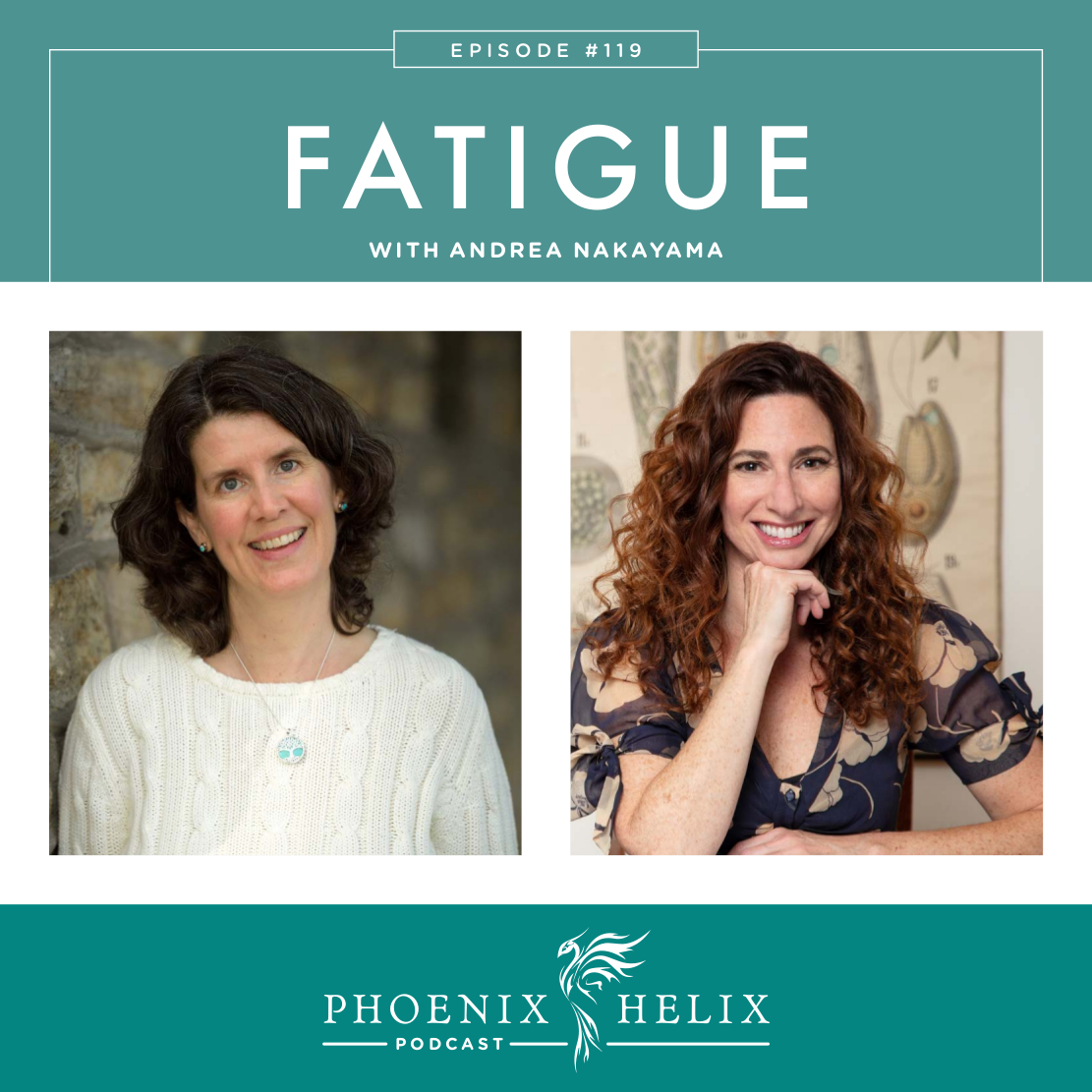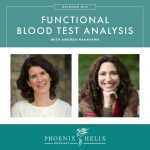The Mystery of Fatigue
Fatigue is a common side effect of autoimmune disease, but it can have many other root causes as well. For some people, it’s mild and manageable. For others, it can be disabling. Yet it’s not a diagnosis in itself – it’s a symptom. In this episode, we take a detective’s perspective on fatigue. If symptoms are messengers, what is our fatigue trying to communicate about our own unique body? How can we restore our vitality again? My guest is Andrea Nakayama, a world-renowned functional nutritionist, educator and speaker, whose mission is to change the way we do healthcare by empowering patients to reclaim ownership over their own health.
Listen to the Show
- Subscribe to my podcast through your favorite podcast app: iTunes, Stitcher, Google, TuneIn, Spotify, Amazon, etc.
- You can also listen to the episode right here through the player below, and if you subscribe to my newsletter you’ll get notified of future episodes.
Podcast: Play in new window | Download
Show Notes
- Intro (0:00)
- Thank You to Our Podcast Sponsor: ShopAIP (2:13)
- An online store, where everything sold is compliant with the elimination-phase of the Paleo Autoimmune Protocol. ShopAIP sells a wide variety of products, including protein bars, AIP-friendly spice blends, cooking and baking ingredients, snacks, non-toxic skincare, and more.
- If you’re a first-time customer, use the code PHOENIX for 10% off your order. Purchase here.
- Meet Andrea (4:18)
- Andrea Nakayama is a world-renowned functional nutritionist, educator, and speaker. She has trained thousands of practitioners in the art and science of healing through her online school, the Functional Nutrition Lab.
- She’s been on this podcast twice before: Ep. 27: Hashimoto’s Disease and Ep. 70: Functional Blood Test Analysis.
- Andrea’s husband was diagnosed with brain cancer in 2000, and she was 7 weeks pregnant at the time. He was given a 6-month prognosis, and they didn’t expect he would live to see their son born. With a combination of alternative and conventional medicine, he lived for 2-1/2 years. Stress and trauma are often triggers for autoimmune expression, and Andrea started experiencing health issues herself. She was eventually diagnosed with Hashimoto’s. Using functional nutrition to support her health and her husband’s health was the seed for her career.
- Defining Fatigue (9:16)
- Fatigue incorporates physical tiredness and reduced energy, but also mental exhaustion and lack of motivation. It can have both physiological and psychological root causes, and it’s rarely just one cause. Usually it’s a combination of factors.
- Some people experience intermittent fatigue. A common pattern is to get extremely tired in the mid-afternoon, push through, and then get a second wind before bedtime and have difficulty falling asleep at night. This is the type of fatigue that Andrea has experienced.
- Then there is the chronic fatigue that is constantly present and can be disabling. Many of Andrea’s patients have experienced this type.
- The Connection Between Autoimmunity & Fatigue (10:21)
- Autoimmunity and fatigue often have the same root causes.
- In addition, autoimmunity and its associated inflammation is a chronic stressor on the body, making fatigue a common side effect of all autoimmune diseases.
- Choosing an Empowered Approach to Chronic Health Issues (12:04)
- When there are a lot of potential causes of fatigue, it can feel overwhelming and even frustrating that there’s no quick fix available. But Andrea encourages everyone to shift their perspective to one of empowerment instead. When you explore your own health history, you begin to see and accept your unique story, and commit to giving yourself the care you need to feel better. It usually takes some trial and error, but as you track your body’s response to interventions, you learn what does and doesn’t work for you. It’s a powerful journey of self-discovery.
- Andrea recommends finding a good health practitioner to guide you, and also developing a therapeutic relationship with yourself, where you learn to trust your inner wisdom.
- Our mindset also impacts fatigue. Negative thoughts can be exhausting.
- Health History via the Functional Nutrition Matrix (17:51)
- Functional medicine always begins with a detailed health history to uncover your unique root causes. Andrea has a visual worksheet called the Functional Nutrition Matrix that she uses with all patients. She also uses this Matrix to look at health conditions in detail, and she created one for Fatigue.
-
- This is where you look at all factors, past and present, that are potentially causing your fatigue:
- Antecedents: genetics and family health history, the story of how you came into the world.
- Triggers: what has happened to you during your life. High-stress events, like injuries, accidents, traumas, abuse, grief. Hormonal shifts like puberty, pregnancy, or menopause. Illnesses and infections.
- Mediators: what is happening in your life right now that might be causing or exacerbating your symptoms. Chronic inflammation, anemia, nutrient deficiencies, digestive problems, emotional stress, etc.
- Self-Care: in which areas are you are doing well and what could use more attention? Sleep hygiene, nutrient-density, eating frequency, supporting digestion, stress management, etc.
- Potential fatigue troubleshooting areas (based on personal health history):
- Gut health.
- Inflammation.
- Some medications have fatigue as a side effect. It helps to be aware off this and see if there’s any way to minimize this effect.
- Address oxidative stress by “eating the rainbow“. The brighter and more varied the colors on your plate, the more antioxidants your food contains.
- Detoxification and liver support.
- Blood sugar balance.
- Hormone balance: thyroid, adrenal, and sex hormones.
- The mind-body connection.
- This is where you look at all factors, past and present, that are potentially causing your fatigue:
- Thank You to our Podcast Sponsor – Paleo on the Go (28:21)
- A frozen meal delivery service, 100% of their menu is compliant with the elimination phase of the paleo autoimmune protocol (AIP). They have over 5o items, including entrees, side dishes, broth, AIP-friendly bacon, and desserts.
- Use the code PHOENIX for 10% off your first order.
- Common Deficiencies that Cause Fatigue (29:51)
- Sleep – sleep quantity and quality is important. If you have trouble sleeping, that can be diagnostic of other root causes to address.
- Water – hydration impacts the body on every level, including energy and vitality.
- Overall nutrition – we need to eat as nutrient-dense and varied a diet as possible, including a rainbow of vegetables and plenty of protein. If we tolerate very few foods, it’s important to work with a practitioner to troubleshoot and help us expand our diet again. (Resource: Are You Eating Enough to Heal?)
- Specific nutrients: omega-3 fatty acids, vitamin D, magnesium, iron, B vitamins, CoQ10. (Note: this doesn’t mean supplementation is necessary. A nutrient-dense diet that incorporates these nutrients is often enough. Try foods first, supplements second. (Resource: The Nutrient Dense Kitchen.)
- The ART of Functional Nutrition (38:36)
- Assess – Look at the problem in detail through a detailed health history / functional nutrition matrix.
- Recommend – Try an intervention based on the assessment.
- Track – Pay attention to how this intervention impacts your unique body. Is it working or not working?
- Repeat.
- Sample Case Studies (40:59)
- Sarah experienced exhaustion in the afternoons. At the end of the workday, she didn’t have the energy to make dinner. She would take a nap on the couch, wake up later that evening, and then have insomnia that night. This pattern of fatigue is often caused by blood sugar imbalance. Sarah tracked her blood sugar with a pin prick monitor after meals. Based on that tracking, she was able to make changes to meals and meal frequency, to stabilize both her blood sugar and her energy levels. PS – blood sugar imbalances can cause insomnia as well (see Shelly’s case study.)
- Miriam experienced high fatigue alongside digestive issues, and her root cause ended up being Hashimoto’s. The key to discovering it was to run a complete thyroid panel (something rarely done in a conventional doctor’s office.) Once they realized autoimmunity was involved, that guided their treatment plan.
- James had a history of abdominal complaints that he managed by limiting his diet to foods that he could digest easily. It was a pretty small list. Then, he became a father, and the sleep-interrupted nights tipped him into exhaustion. While at first glance, it would appear that lack of sleep was the primary driver behind his fatigue, the deeper issue ended up being nutrient deficiencies cause by his long-term limited diet. So they focused on supporting digestion, expanding his diet, and optimizing nutrition, which gave him the foundation to maintain his energy under the new demands of parenthood.
- Outro (55:12)
- Andrea trains practitioners through The Functional Nutrition Lab. She offers patient counseling services through the Functional Nutrition Alliance. She has a podcast for practitioners called the 15 Minute Matrix. She also has a free gift for anyone interested. It’s her Food Mood Poop ebook, which teaches the art of personal tracking and self-assessment.
- Eileen (your podcast host) is the author of multiple books, written to help people thrive with autoimmune disease. Learn more on the Books Page.
- If you like this podcast, follow or subscribe through your favorite podcast app. You can also subscribe to Eileen’s biweekly newsletter.
- Check out the entire archive of podcast episodes.
You May Also Be Interested In
Spreading the Word
If you like the podcast, please leave a positive review in iTunes. It would mean the world to me, and also helps others find the podcast. Here are some quick instructions using your iPhone:
- If you are already subscribed to my podcast: (1) Click the purple podcast icon. (2) At the bottom of the screen, click Library. (3) At the top of the screen, click Shows. (4) Click the Phoenix Helix podcast image. (5) Scroll down the page, and you’ll see Ratings and Reviews. Scroll down a little bit more and click on Write a Review. This will bring up the review screen. Tap 5 stars (if you love the podcast), and then click in the title box, and it will bring up the keyboard. Enter a title and short review. (6) Click Send in the upper right corner. (7) Thank you! Positive reviews give the podcast a higher search ranking in iTunes, helping people find it and letting them know it’s a quality podcast and worth their time to listen.
- If you haven’t subscribed to my podcast: (1) Click the purple podcast icon. (2) In the lower right corner, click the magnifying class. (3) Type Phoenix Helix in the search box. (4) Click the podcast cover in the Show list. (5) If you’d like to subscribe, click the + sign at the top of the screen. (6) To write a review, scroll down the page, and you’ll see Ratings and Reviews. Scroll down a little bit more and click on Write a Review. This will bring up the review screen. Tap 5 stars (if you love the podcast), and then click in the title box, and it will bring up the keyboard. Enter a title and short review. (7) Click Send in the upper right corner. (8) Thank you! Positive reviews give the podcast a higher search ranking in iTunes, helping people find it and letting them know it’s a quality podcast and worth their time to listen.








